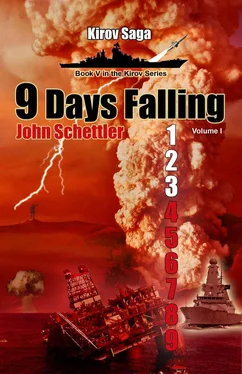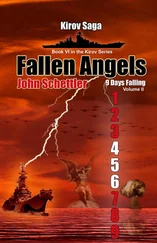The news feed was the one intangible thing in Flack’s world. He could handle everything they did at sea, and below ground where the rigs were working. It was that annoying news feed, those “events above the ground” as his colleagues called them, that always posed the real problem. His fax might buy him about twenty four hours, which was just the time he would need to get that rig set and see Crowley’s tugs safely off to Baku again. The Bollinger Boys would Google up the news on the pipeline explosion, and then wait for his next report. In the meantime, he thought, he had better get a call in to Timmermann and his merry band of mercenaries.
There was a strange feeling in the air now, an uneasy pre-dawn quiet that was about to ignite. There were pipelines all over the region, fragile collection points, flow stations, rigs and well sites. And it was all sitting on a lot of flammable oil, with bands of hit and run militants sniping, burning and making ever more threatening statements in the local news outlets.
The statements soon coalesced into an organized resistance called the “Movement for the Emancipation of Caspian Central Asia,” or MECCA. Guess who was likely to be behind a name like that? Damn Al Qaeda. The group was stiffened by a shadowy leadership structure, and their stated aim was to totally destroy Kazakhstan’s capacity to export oil. To that end they had already walked a quarter of the mile. Exports were down sharply as MECCA tactics became more sophisticated each year.
The raids were more frequent, lightning quick speed boat attacks by well armed men wearing white turbans and black scarves to mask their faces. There were thousands of men like this available in this poverty stricken region, all easy hires for a day, a week, a single operation or more extended campaign. They filtered down from the general chaos in the desolate regions of the country, where roving bands the locals called ‘Khazars’ haunted the parched landscape.
Last year, before Flack’s watch, Shell had to abandon facilities producing over 600,000 barrels per day, under relentless pressure from MECCA guerillas. When the attacks finally quieted down Shell engineers were sent in to reclaim the rigs and platforms, only to find much of the equipment was simply gone. In the area near the Karaton terminal alone, 35 miles of pipeline disappeared, disassembled by marauding gangs of dissidents, loaded onto barges, offloaded onto trucks, and then delivered to Chinese scrap metal dealers. There was always someone ready to feed on the ruin of another’s misfortune, to turn a quick profit. It was literally a corporate world of dog eating dog.
“This business will get out of hand,” Flack murmured aloud. The Saudis would never leave their rigs in a situation like this. Here he was about to hire on mercs for protection that his own company, his own damn government and all the investment companies, had failed to provide—let alone the fledgling Kazakh government. They were so busy with local factional squabbles that there was little muscle in the Kazakh Army to enforce general order in the region.
They were lucky they had at least one Air Mobile Brigade out here to give the Russians second thoughts about crossing that border up north. But he knew if the Russians came they would roll with nothing less than a full Motor Rifle Division. When will those prissy Senators and Congressmen in DC get serious about this energy situation? Well, they’ll learn where their bread is buttered in time, just like the folks back home. They’ll learn there’s only so much oil you can squeeze out of a rock, and that it cost a hell of a lot more than pumping it here. Things were tightening up in the Gulf, in the Caspian, and the Middle East had been running dry for years. That meant trouble at home would soon follow.
The next phone call confirmed Flack’s worst misgivings. News was hitting the AP wire hard that morning. Royal Dutch Shell, the region’s biggest developer, was reporting that the main pipelines serving their “Sunny Light” field were hit again, and now off line. The damage was cascading all through the region. Shell was taking over 650,000 barrels of daily production off line! All that would do is increase the pressure on him to deliver, and deliver big.
He squinted out of the foredeck pane and looked into the grey dawn. There was a char of black smoke smudged across the sky, probably the pipeline fire that the crews were trying to control. While he was out here on his rig running numbers and looking for a few men with guns to safeguard the traffic, the folks back home would be lining up at the shopping malls for the blowout pre-holiday season specials that were sucking in the last of their dollars. Americans would shop until the Chinese workers who made the goods they bought would drop.
Perhaps the old consumer society could keep from choking once again this Christmas. It would die off altogether soon enough. Maybe not this year, he thought, but they would all learn where their bread was buttered as well—and sooner than even he could imagine. The war he had heard about behind all the distraction of these local events, was indeed more serious than he realized. In due course he would be faced with his worst case scenario…The Russians.
Milesto the south, in the quiet port of Larnaca, Cyprus, the pipelines of the Caspian Sea were about to become entangled with the lives of a very special person, and a very tough sea captain on a very dangerous ship. It was a circumstance that would bring the Fairchild company into the midst of the gathering storm of war, and link its fate to that of many others who were now hot in the chase to find one very important man—Gennadi Orlov.
The quiet the lights of the city were glittering like jewels on the nearby harbor at Larnaca Bay, and belied the turmoil of the world that evening. The sea was calm, the night fair on the gloaming horizon, the skies clear and cloudless in the temperate Mediterranean climate of those first days of autumn, 2021. Captain Gordon MacRae was standing on the bridge of the corporate security vessel Argos Fire that evening, ready to finish his watch and retire to dress whites for an important dinner guest arriving soon.
MacRae knew nothing of the travails of Gennadi Orlov that night, but would soon come to know more than he ever desired. Fate was reaching out her hand and dragging pieces across the chessboard of time, both future an past, and MacRae, his ship, and the company it served were soon to be embroiled in the fight for the vital center of the board. He could see a part of what was coming. Lord, the headlines had spoken enough of the trouble that would darken his seas in the days and weeks ahead. Perhaps trouble is coming to dinner tonight, he thought, then put that aside to gaze out into the harbor an take in the quiet coming of the night.
At one time the port at Larnaca might have been considered large, particularly to the Crusaders who once used it as a waypoint before landing in the Holy Land. Situated on the island of Cyprus, the harbor was a balmy tourist destination in the Eastern Med. It would seem small by modern standards, a backwater with long seaside boulevards fringed with tall palms swaying in the gentle breeze, a harbor for cruise ships and ferries, and the occasional merchant marine vessel. The two small quays on the port were enough to accommodate three or four commercial ships at one time, and Captain MacRae had radioed ahead to be certain his berthing would be available that night.
There were only two other ships in port that day, the Kristina Regina , a 4300 ton cruise ship of Finnish registry with a maximum capacity of perhaps 350 people, and the Holland Americas Line Rotterdam , a much bigger cruise ship that was slated to depart three hours before Argos made port, taking most of the tourist traffic with it. That was just the way MacRae liked his visits: quiet night berthings, on low traffic days, where the sleek military lines of his vessel would not draw much attention from either locals or tourists.
Читать дальше












